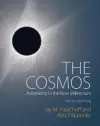
The Cosmos
2 authors - Paperback
£65.99
Jay M. Pasachoff, Field Memorial Professor of Astronomy at Williams College, teaches the astronomy survey course. He is also Director of the Hopkins Observatory there. He received his undergraduate and graduate degrees from Harvard and was then at Caltech, where he has also had recent sabbatical leaves. He has observed 69 solar eclipses. He also studies occultations of stars by Pluto and other objects in the outer Solar System. Pasachoff is Chair of the Working Group on Eclipses of the International Astronomical Union and was Chair of the American Astronomical Society's Historical Astronomy Division. He is also co-editor of Teaching and Learning Astronomy (Cambridge, 2005) and Innovation in Astronomy Education (Cambridge, 2008). He received the American Astronomical Society's Education Prize (2003); the Janssen Prize from the Société Astronomique de France (2012), and the Richtmyer Memorial Lecture Award, American Association of Physics Teachers (2017). In 2019, he was awarded the Klumpke-Roberts Award for his outstanding contribution to the public understanding and appreciation of astronomy. Asteroid (5100) Pasachoff is named after him. Alex Filippenko is a Professor of Astronomy, and the Richard and Rhoda Goldman Distinguished Professor in the Physical Sciences, at the University of California, Berkeley. He received his undergraduate degree from the University of California, Santa Barbara (1979) and his doctorate from the California Institute of Technology (1984). His primary areas of research are exploding stars, gamma-ray bursts, active galaxies, black holes, and observational cosmology. Filippenko was the only person to have been a member of both teams that revealed the Nobel-worthy accelerating expansion of the Universe. He is one of the world's most highly cited astronomers and was elected to the National Academy of Sciences (2009). Filippenko has won many prestigious teaching awards, including the Carnegie/CASE National Professor of the Year among doctoral institutions (2006). He has appeared frequently on science newscasts and television documentaries, especially The Universe series. He received the Carl Sagan Prize for Science Popularization (2004).